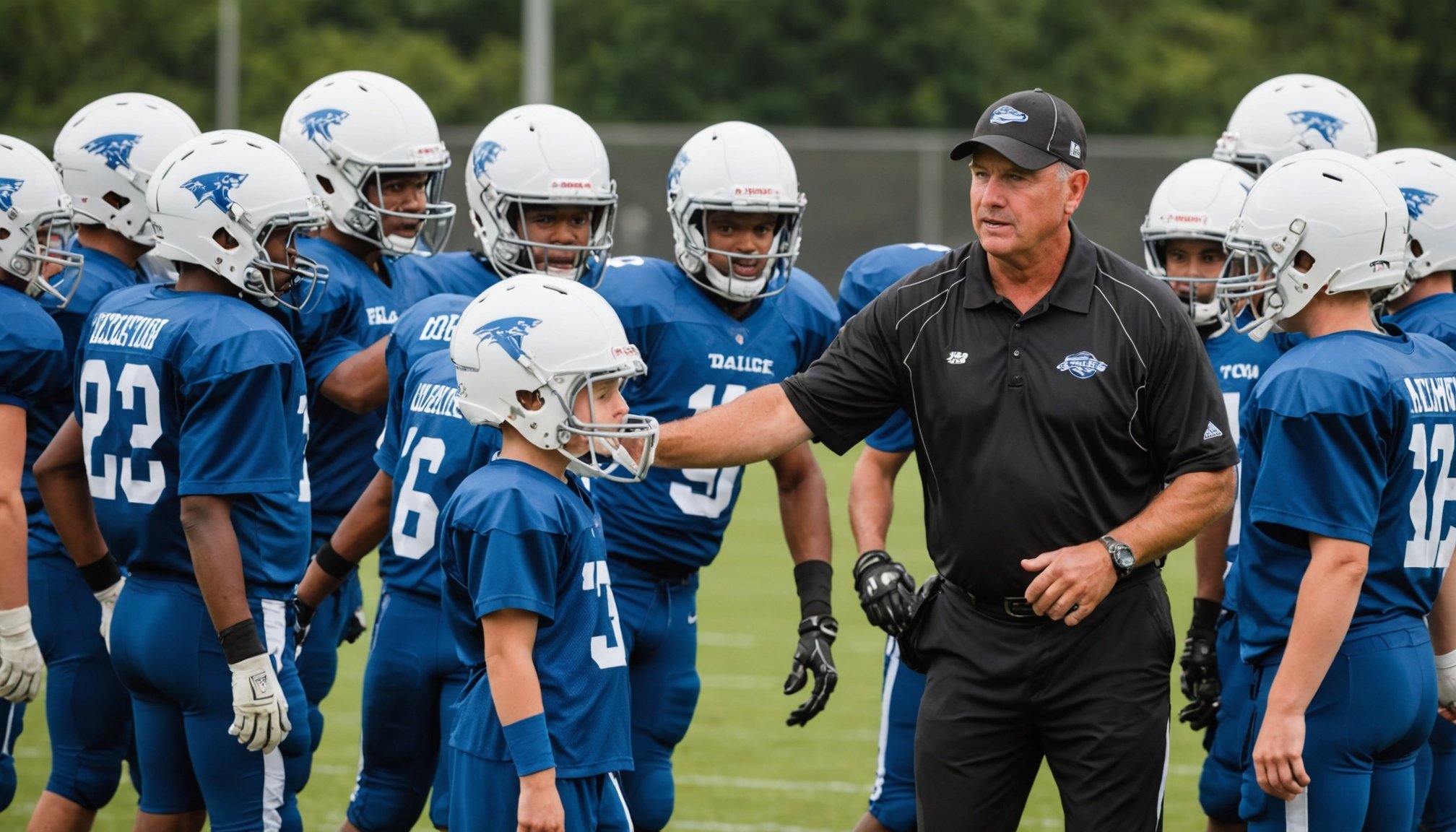Youth football coaches often face the challenge of managing overprotective parents who can disrupt team dynamics and hinder player development. Understanding the motivations behind parental behavior is key. Effective strategies, such as fostering open communication, setting clear expectations, and creating a supportive environment, empower coaches to guide both players and parents. This proactive approach not only enhances the overall experience but also builds a positive team culture, ensuring that young athletes can thrive on and off the field.
Understanding the Role of Parents in Youth Sports
Parental involvement in youth sports is crucial for a child's development and enjoyment of the game. It shapes the youth sports dynamics significantly, influencing not only the child's experience but also the overall environment.
Also to discover : Top Strategies for Football Coaches to Cultivate a Culture of Ongoing Improvement
Significance of Parental Involvement
Parents play a vital role in motivating and supporting their children. Their involvement can boost a child's confidence and enhance performance in youth football. However, it's essential to understand the balance between being supportive and becoming overprotective.
Types of Parent Behaviors
Different types of parental behaviors can have varying impacts on youth sports dynamics. Positive behaviors include encouragement and understanding, which foster a healthy sports environment. On the other hand, negative behaviors, such as excessive pressure or criticism, can lead to stress and burnout.
This might interest you : Top Techniques to Effectively Manage Pre-Match Stress for Football Success
- Supportive: Encourages participation and enjoyment.
- Overprotective: Limits independence and growth.
- Critical: Focuses on performance rather than effort.
Balancing Support and Overprotection
Finding the right balance is key. Parents should aim to provide support without crossing into overprotection. This involves allowing children to experience challenges and learn from their mistakes, fostering resilience and independence in youth sports. By doing so, parents contribute positively to the youth sports dynamics.
Recognizing Overprotective Behavior
Understanding the nuances of overprotective parents is essential in youth sports. Recognizing these behaviors can help mitigate their negative effects on young athletes.
Common Signs of Overprotective Parenting
Overprotective parents often exhibit certain behaviors that can be identified in youth sports. These include:
- Constantly intervening in coaching decisions
- Shielding the child from any form of criticism
- Preventing participation in challenging situations
Such behaviors can limit a child's ability to develop resilience and independence, crucial traits for young athletes.
Psychological Impacts on Young Athletes
The psychological impacts of overprotection can be profound. Children may experience increased anxiety, reduced self-esteem, and a lack of confidence in their abilities. The fear of making mistakes can hinder their growth and enjoyment in sports.
"Overprotection can stifle a child's natural development, leading to a dependency that affects their performance." – Sports Psychologist
Real-Life Examples in Youth Football
Consider a youth football league where overprotective parents frequently intervene. A child might be pulled from a game at the slightest hint of difficulty, or parents may confront coaches over playing time. These actions, while well-intentioned, can create a stressful environment for the young athlete, ultimately affecting their love for the game.
Effective Communication Strategies
Understanding how to engage parents in youth sports can transform the experience for both children and adults.
Best Practices for Initiating Conversations
Initiating open and effective communication with parents is essential. Start by creating a welcoming environment where parents feel comfortable sharing their thoughts. Encourage them to express their expectations and concerns about their child's participation in youth sports. This approach fosters trust and aligns everyone’s goals.
Active Listening and Empathy
Active listening is a cornerstone of communication techniques. It involves attentively hearing parents' concerns and responding with empathy. By acknowledging their feelings and perspectives, you demonstrate respect and understanding. This empathetic approach can defuse tensions and build stronger relationships, enhancing overall parent engagement.
Setting Clear Communication Channels
Establishing clear communication channels is crucial for maintaining consistent parent engagement. Set expectations early by outlining how and when information will be shared, whether through emails, meetings, or newsletters. This clarity prevents misunderstandings and ensures that all parties are informed and involved.
"Clear and open communication strengthens the partnership between coaches and parents, ultimately benefiting young athletes." – Youth Sports Expert
Effective communication strategies not only improve the youth sports environment but also empower parents to support their children constructively.
Building Trust and Rapport with Parents
Fostering strong connections with parents enhances the youth sports experience.
Strategies for Establishing Trust
Building trust with parents begins with proactive communication. Coaches should clearly articulate their vision and goals for the team, ensuring parents are aware of the coaching philosophy. This transparency builds confidence and aligns expectations.
Strategies to establish trust:
- Open Meetings: Host regular meetings to discuss team progress and address concerns.
- Feedback Sessions: Provide opportunities for parents to share their thoughts and receive updates.
Importance of Transparency
Transparency in coaching decisions is vital for maintaining a positive parent-coach relationship. By explaining the rationale behind team selections and strategies, coaches can alleviate misunderstandings. This openness fosters a collaborative environment where parents feel valued.
"Transparency in decision-making builds a foundation of trust and respect." – Sports Leadership Expert
Engaging Parents Through Updates
Regular updates and feedback are essential for keeping parents engaged. Whether through newsletters, emails, or meetings, maintaining consistent communication ensures parents are informed and involved. This practice not only strengthens trust building but also enhances the overall experience for young athletes.
Regular updates include:
- Performance Reviews: Share insights on individual and team performance.
- Development Plans: Outline future goals and areas for improvement.
Setting Boundaries and Expectations
Establishing clear roles and guidelines in youth sports
Defining Appropriate Roles for Parents
In youth sports, it's essential to define appropriate roles for parents to ensure a supportive environment. Parents should focus on being cheerleaders rather than coaches, allowing professional coaches to guide the team. By understanding their role, parents can contribute positively to the sports experience.
Communicating Boundaries Clearly and Respectfully
Communicating boundaries is crucial for managing expectations. Coaches should establish clear guidelines about parental involvement at the start of the season. This can be achieved through meetings or written materials outlining what is expected from parents. Respectful communication fosters a collaborative atmosphere.
Key Points to Communicate:
- Parents should encourage rather than instruct.
- Feedback should be directed to coaches, not players.
- Attendance at games and practices should be supportive.
Handling Boundary Violations Effectively
When boundary violations occur, addressing them promptly and effectively is vital. Coaches should have a plan in place to manage these situations, ensuring that all parties understand the importance of maintaining set boundaries. This approach helps reinforce boundary setting and maintains a positive environment.
"Effective boundary management is key to a harmonious youth sports experience." – Youth Sports Coordinator
By clearly defining roles and managing expectations, parents can become valuable supporters in their children's sporting journey.
Conflict Resolution Techniques
Exploring effective methods to manage and resolve conflicts in youth sports.
Identifying Potential Sources of Conflict
Conflicts in youth sports often arise from misunderstandings between parents and coaches. Common sources include disagreements over playing time, coaching decisions, and perceived favoritism. Recognizing these potential sources of conflict early can help in preventing escalation.
Potential Conflict Sources:
- Discrepancies in expectations
- Communication breakdowns
- Misalignment of goals
Techniques for De-escalating Tense Situations
De-escalating tension is crucial for maintaining a positive sports environment. One effective conflict management strategy is active listening, which involves genuinely understanding the concerns of all parties. Additionally, maintaining a calm demeanor and using neutral language can help diffuse heated situations.
"Effective communication is the cornerstone of conflict resolution." – Conflict Resolution Expert
Collaborative Problem-Solving Approaches
Engaging in collaborative problem-solving encourages cooperation between parents and coaches. This involves working together to find mutually beneficial solutions. By focusing on shared goals, such as the child's development and enjoyment, conflicts can be resolved more amicably. Encouraging open dialogue and brainstorming solutions ensures that all voices are heard and respected.
Key Strategies:
- Joint meetings to discuss issues
- Setting common objectives
- Regular feedback sessions
Implementing these resolution strategies fosters a harmonious environment, enhancing the overall youth sports experience.
Encouraging Healthy Parent Involvement
Enhancing the youth sports experience through positive parent participation.
Ways to Involve Parents Positively in Team Activities
Incorporating positive involvement from parents can significantly enhance the youth sports environment. Encouraging parents to participate in team activities, such as organizing events or assisting with logistics, fosters a sense of community. This involvement should be structured to ensure it supports the team's objectives without overstepping boundaries.
Recognizing and Celebrating Parental Contributions
Acknowledging and celebrating parental contributions is crucial for reinforcing positive involvement. Coaches can host appreciation events or send personalized thank-you notes to recognize parents' efforts. This recognition not only boosts morale but also strengthens the bond between parents and the team.
Key Recognition Methods:
- Appreciation events
- Personalized thank-you notes
- Public acknowledgments at games
Educating Parents on Supportive Behaviors
Educating parents about supportive behaviors is vital for maintaining a healthy sports environment. Workshops or informational sessions can be organized to guide parents on how to be involved constructively. By understanding the impact of their actions, parents can ensure their participation positively influences their child's sports experience.
"Educating parents on supportive behaviors transforms their involvement into a powerful asset." – Youth Sports Educator
By focusing on positive involvement, teams can create a collaborative atmosphere that benefits young athletes and their families.
Creating a Positive Team Environment
Fostering a culture that enhances youth sports experiences.
Importance of Fostering a Supportive Team Atmosphere
A positive environment is crucial for developing a strong team culture. It encourages players to collaborate and support each other, enhancing their enjoyment and performance. A supportive atmosphere helps reduce stress and promotes a sense of belonging, which is essential for young athletes' development.
Strategies for Promoting Teamwork Among Players and Parents
To cultivate a cohesive team culture, implement strategies that encourage collaboration. Organize team-building activities that involve both players and parents. This approach strengthens bonds and reinforces the values of teamwork and mutual respect.
- Team Workshops: Conduct sessions focusing on communication and cooperation.
- Family Events: Host events where families can engage in fun activities together.
- Joint Goals: Set common objectives to unite players and parents.
Recognizing the Role of Parents in Enhancing Team Culture
Parents play a pivotal role in shaping a positive environment. By modeling supportive behavior, they contribute to a healthy team culture. Encouraging parents to participate in team activities and recognize their efforts fosters a sense of community and shared purpose.
"A thriving team culture is built on the foundation of a positive environment and active parental involvement." – Team Dynamics Expert
Real-life Case Studies and Scenarios
Exploring practical insights from youth sports environments.
Analysis of Successful Strategies
In examining real-life case studies, several successful strategies emerge. One youth coach implemented a parental engagement program that included regular workshops and feedback sessions. This approach fostered a collaborative atmosphere and significantly reduced conflicts. Another case study highlighted the use of clear communication channels, ensuring all parties were informed and aligned on team goals.
Successful Strategies:
- Regular workshops
- Feedback sessions
- Clear communication channels
Lessons Learned from Challenging Situations
Challenging parent-coach situations often provide valuable lessons. In one scenario, a coach faced difficulties with overprotective parents. By initiating open dialogues and setting boundaries, the coach managed to turn the situation around, demonstrating the importance of effective communication and boundary setting. These real-life examples underscore the need for patience and understanding in managing parent dynamics.
Insights from Experienced Youth Coaches
Interviews with experienced youth coaches reveal that case studies are invaluable for learning. Coaches emphasize the importance of building trust and rapport with parents. As one coach noted, "Understanding and empathy are key in navigating complex parent-coach relationships." These insights highlight the practical applications of lessons learned from real-life scenarios in youth sports settings.
Resources and Support for Coaches
Enhancing the coaching journey through valuable resources.
Recommended Books and Articles
For youth coaches seeking to improve parent-coach dynamics, several books and articles provide insightful guidance. These resources delve into effective communication strategies and boundary-setting techniques, essential for fostering positive interactions. Noteworthy titles include "The Sports Parent's Playbook" and "Coaching with Character."
Online Forums and Communities
Joining online forums and communities offers a platform for coaches to share experiences and gain support. These networks allow coaches to discuss challenges and successes, providing a sense of camaraderie. Engaging in these forums can enhance understanding of coaching resources and offer practical advice from peers.
Popular Platforms:
- Coach’s Corner Forum
- Youth Sports Network
- Coaching Community Hub
Professional Development Opportunities
Professional development opportunities are crucial for coaches aiming to enhance their skills. Workshops, webinars, and certification courses provide in-depth knowledge on handling parent-coach dynamics. These programs often cover topics such as conflict resolution and effective communication, empowering coaches to create a supportive environment.
"Continuous learning is the key to successful coaching." – Coaching Development Expert
By leveraging these support networks, coaches can access a wealth of knowledge and resources, ultimately benefiting both themselves and their young athletes.











